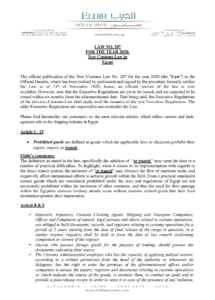Egypt issued amendments concerning the Egyptian customs law and the effects of such changes, focusing on prohibited goods, as well as on the penalties that will follow under the possibility of non compliance.
Carriers and their agencies role in the shipping industry in Egypt should be aware of the following:
Prohibited goods are defined as goods which the applicable laws or decisions prohibit their export, import, or transit.
Accordingly:
- Importers, Exporters, Customs Clearing Agents, Shipping and Transport Companies, Offices and Companies of natural, legal persons and others related to customs operations, are obliged to hold documents, records, and registers relating to customs operations for a period of 5 years starting from the date of final release of the cargo in question; in a similar respect, registers shall be held as from the date of last remark confirming completion or closure of the register.
- Anyone who possess foreign goods for the purpose of trading, should possess the documents indicating their source.
- The Customs Administration employee who has the capacity of applying judicial seizure, according to a written permission from the head of the authority or whomever he delegates, has the right to enter the premises of the aforementioned offices and/or companies to peruse the papers, registers and documents relating to customs operations or which indicate the source of the goods, to examine them, to conduct an audit and to provide a post-release review in order to seize it in case of the presence of any violation.
Penalties
Anyone who violates the provisions above, shall be penalized with a fine equivalent to the customs tax. If the audit and subsequent review cannot be carried out and prevents the person from the customs authority from implementing the written permission referred to in Article 9 of this law, a fine of EGP 20,000.00 shall be imposed, unless there are justifiable reasons acceptable to the Customs Authority.
Concerning In Transit Cargo
- Cargoes of foreign origin may be transported according to the transit cargoes system without taking the maritime route; whether these cargoes have entered the borders to directly exit from other borders or they were sent from one of the customs branches to another branch after the submission of one of the guarantees accepted by the authority.
- Transit cargoes shall not be subject to restriction or ban unless otherwise stipulated in the laws or decisions issued in that regard. The carrier shall be responsible for every loss, shortage or alteration of the cargoes or damage to the seals or tampering with it without prejudice to the responsibility of the owner of the cargoes.
- The customs tax and other due taxes and fees shall be estimated on the date of submission of the guarantee.
In addition, following the amendments, Swedish Club’s Egyptian correspondents Eldib, recommends the following:
- Dealing with customs officers with care and sense of cooperation.
- Carriers or their agents shall keep the documents, records, and registers relating to customs operations for a period of 5 years starting from the date of final release of the cargo in question; in a similar respect, registers shall be held as from the date of last annotation confirming completion or closure of the register.
- Before the acceptance to import any goods to an Egyptian importer, the carriers or their representatives have to ensure that the shipper submits the evidence confirming that the Egyptian importer is registered in the Customs’ Authority register.
- Carriers or their agents shall inform any exporter to Egypt that the latter will be liable for any fine in case of omissions to the list what should be mentioned in the cargo manifest or of listing invalid items, and it is preferable to add the same as a term of the terms & conditions which governs the bills of lading (contract of carriage).
- We recommend not to accept any sort of waiver to any bill of lading pending issuance of the Executive Regulations, fearing that the assignee may not be registered with the customs as an importer which would subject the carrier to fines as provided for in Article (46) of the Law.
For more information, click on the paper herebelow





























































